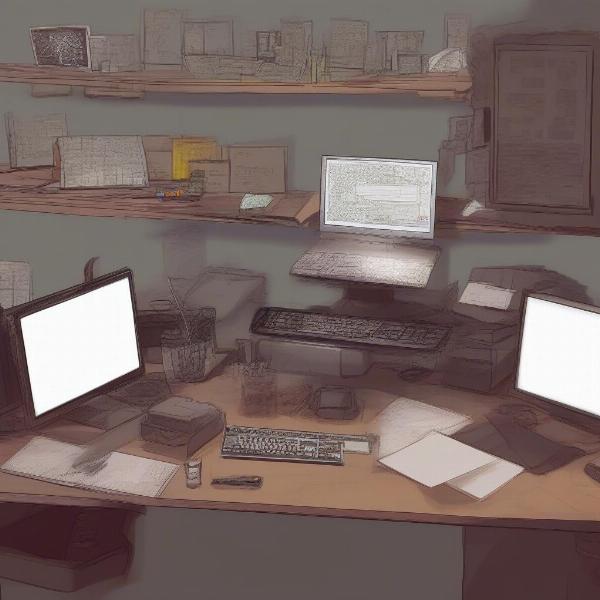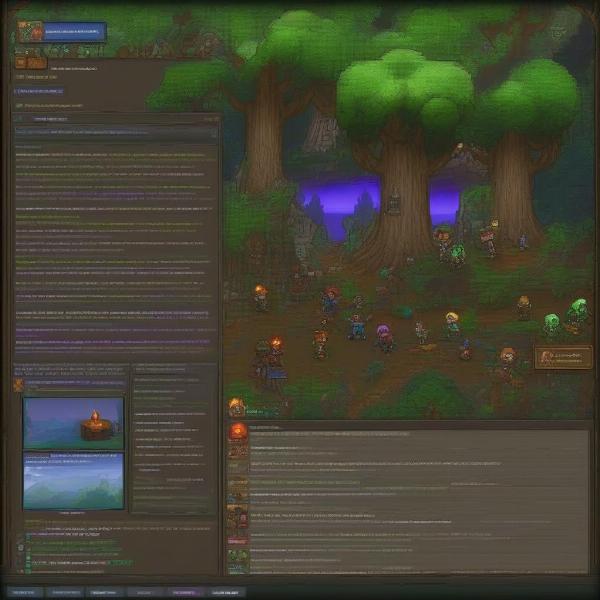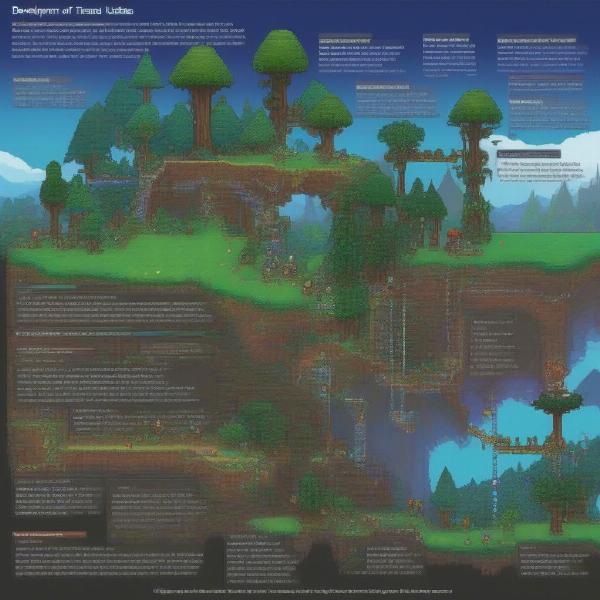Yes, Terraria is undeniably an indie game. Developed by the small team at Re-Logic, it showcases the spirit of independent game development with its unique blend of 2D sandbox gameplay, exploration, and crafting. But what truly defines its indie status goes beyond its humble beginnings. This article will delve into the history of Terraria, its development process, and the factors that solidify its position as a prominent indie title in the gaming world.
Understanding Indie Game Development and Terraria’s Place
What exactly constitutes an “indie game”? While there’s no strict definition, several key characteristics often apply. Indie games are typically created by small teams or individuals, often with limited budgets and resources. They prioritize creative freedom and innovative gameplay over mainstream appeal, leading to unique and sometimes experimental experiences. Terraria perfectly embodies these qualities. Re-Logic, a small, independent studio, poured their passion into the project, resulting in a game that captured the hearts of millions with its distinctive charm and deep gameplay mechanics.
The Humble Beginnings of a Sandbox Masterpiece
Terraria’s development began with Andrew “Redigit” Spinks at the helm, driven by his vision of a 2D sandbox adventure. The small team at Re-Logic worked tirelessly to bring this vision to life, coding, designing, and testing with a dedication characteristic of indie development. This hands-on approach allowed for a level of flexibility and responsiveness that larger studios often struggle to achieve.
 Terraria Indie Game Development Team
Terraria Indie Game Development Team
Creative Freedom and Innovation: The Hallmarks of Indie Games
Terraria’s indie spirit shines through in its unique blend of genres. It seamlessly merges elements of exploration, crafting, building, and combat, offering players an experience that is both familiar and refreshingly different. This freedom to experiment and defy conventional genre boundaries is a hallmark of indie game development, allowing developers to explore uncharted territory and create truly innovative experiences.
Terraria’s Impact on the Indie Game Scene
Terraria’s success story has inspired countless aspiring indie developers. Its demonstration that a small team with a strong vision can create a globally recognized and beloved game has become a beacon of hope for those seeking to enter the industry.
Terraria: A Case Study in Indie Success
Terraria’s success wasn’t built on massive marketing campaigns or corporate backing. It thrived through word-of-mouth, positive reviews, and a dedicated community that embraced its unique charm. This organic growth is a testament to the game’s inherent quality and the power of community engagement, both characteristic of successful indie titles.
Community Engagement: The Heart of Indie Game Development
Re-Logic’s active engagement with the Terraria community has been instrumental in its continued success. They listen to player feedback, incorporate suggestions, and regularly release updates, fostering a strong sense of connection and ownership within the player base. This close relationship between developers and players is a hallmark of indie game development, allowing for a dynamic and evolving experience.
 Terraria Indie Game Community Engagement
Terraria Indie Game Community Engagement
The Power of Word-of-Mouth Marketing
Terraria’s initial success wasn’t driven by expensive advertising campaigns. It was the players themselves who became the game’s biggest advocates, spreading their enthusiasm through online forums, social media, and streaming platforms. This organic growth is a testament to the game’s captivating gameplay and the strong community it fostered.
Long-Term Support and Content Updates
Even years after its initial release, Terraria continues to receive updates and new content. This dedication to long-term support is a reflection of Re-Logic’s passion for their creation and their commitment to their community, a commitment often seen in successful indie titles.
Is Terraria Still Considered Indie Today?
Even with its massive success and millions of copies sold, Terraria remains firmly rooted in its indie origins. Re-Logic, while having grown over the years, retains its independent spirit and commitment to creative freedom. They continue to prioritize player feedback and community engagement, reinforcing Terraria’s position as a beloved indie gem.
Maintaining the Indie Spirit Despite Commercial Success
The success of Terraria has allowed Re-Logic to expand and improve their operations, but they have never lost sight of the indie values that made the game what it is today. They continue to operate independently, making decisions based on creative vision and community feedback rather than corporate pressures.
 Terraria Indie Game Legacy
Terraria Indie Game Legacy
Conclusion: Terraria – A Triumph of Indie Game Development
Terraria’s journey from a small indie project to a global phenomenon is a testament to the power of creative vision, community engagement, and independent development. It’s a game that continues to inspire both players and developers alike, proving that indie games can not only compete with but also surpass mainstream titles in terms of innovation, depth, and lasting impact. Terraria is, without a doubt, an indie game, and its legacy continues to shape the landscape of independent game development. So, the next time you delve into its pixelated world, remember the small team and the indie spirit that brought this masterpiece to life. Share your favorite Terraria moments in the comments below!
FAQ
-
Who developed Terraria? Terraria was developed by Re-Logic, an independent game studio.
-
When was Terraria released? Terraria was initially released in 2011.
-
What platforms is Terraria available on? Terraria is available on a wide range of platforms, including PC, consoles, and mobile devices.
-
What genre is Terraria? Terraria is a 2D sandbox adventure game with elements of exploration, crafting, building, and combat.
-
Is Terraria single-player or multiplayer? Terraria offers both single-player and multiplayer modes.
-
Why is Terraria considered an indie game? Terraria is considered an indie game because it was developed by a small, independent team with a focus on creative freedom and community engagement.
-
How has Terraria impacted the indie game scene? Terraria’s success has inspired countless indie developers and demonstrated that small teams can create globally successful games.

